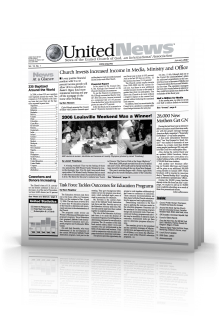Council Considers GCE Meetings for 2007 and Beyond
Dec. 11, David Register, chairman of the GCE Planning Task Force, presented a schedule and theme proposal for the 2007 annual meeting of the General Conference of Elders.
Mr. Register briefly reviewed the overall schedule, which is virtually the same as in recent years. For example, there will be a welcome reception on Friday evening, May 4. Sabbath services on May 5 will be from 2 to 4 p.m. The business meeting will begin at 9 a.m. on Sunday, May 6. Workshops and seminars will be offered on Monday, May 7.
The Council engaged in a lengthy discussion about the value of and most appropriate format for the question-and-answer sessions for the operation managers (which was held last year on Saturday evening) and Council of Elders (held last year on Sunday evening). Several ideas were put forward. Council members agreed that Q&A is an important facet of the conference. Mr. Register will work with Ministerial Services and the Council in developing a different format that will make the Q&A more effective and useful.
The task force report recommended three potential themes for the conference. After consideration of all three, the Council unanimously agreed on the theme “Build the House.” The introduction to this theme in the report provides an overview:
This theme encompasses the basic idea of everything the Church should be doing:
• Become the spiritual temple the Father has envisioned.
• Prepare a people to contribute to the building of the temple.
• Become a unified and cohesive structure.
• Build with a sense of purpose and zeal.
The Council expressed its approval of the task force's work. Mr. Register will present a completed plan for the annual GCE at the February-March Council meetings.
Future GCE Meetings
Mr. Dick led the Council into a discussion of long-range plans for future meetings of the General Conference of Elders.
Given the changes in the Church and its current condition, the question arises, “Is it necessary to continue to have an annual meeting to conduct the business of the General Conference of Elders?” With current methodology and technology it is no longer necessary for the GCE to have a conference to conduct its annual business meeting.
Mr. Dick stated that this is a huge question, opening a number of other issues and questions that would need to be seriously considered. For example, if the GCE meeting were held less frequently and if funds equal to the current cost of the conference were set aside each year, how long would it take to fund attendance for all the elders? And, he posed, is that even feasible?
Mr. Dick emphasized that the Council should keep in mind the needs and concerns of the elders in any discussion of change to scheduling of the GCE meetings. He stated, for example, that if the GCE were to meet less frequently, it would be important to explain what contact and communication would take place during the year in lieu of the annual meeting.
Mr. Dick opened the floor to comments, which included:
• The need for a conference for U.S. pastors is not as great now as it was in the past because there are other points of contact and communication, such as regional conferences.
• There is a more urgent need for regular contact and communication in international areas because they are more scattered and often don't have regional conferences. There might be an opportunity to create international zones, for example the nations in Asia and the Pacific, and bring elders together in those areas for a meeting similar to U.S. regional conferences.
Further discussion is scheduled for the next Council meeting.


